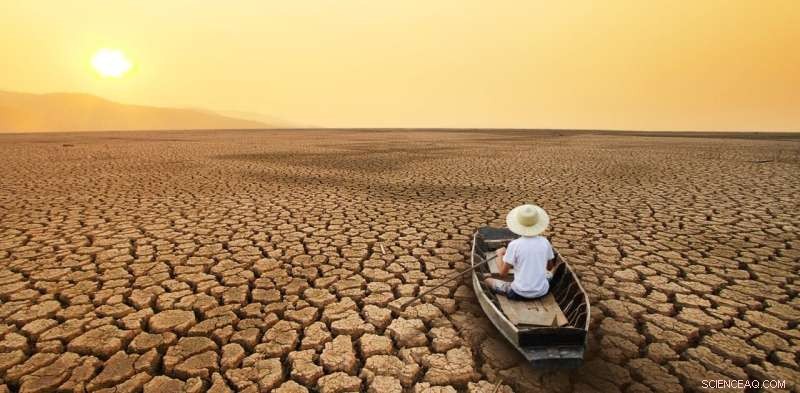
Crédito:Piyaset/Shutterstock
El último informe de la ONU sobre los impactos potenciales del cambio climático da un veredicto sombrío, con algunos efectos que ahora se consideran inevitables. Pero también hay lecciones sobre desastres y conflictos violentos que podrían ayudar a salvar vidas y crear sociedades más seguras independientemente del cambio climático causado por el hombre.
El principal texto disponible del informe del Panel Intergubernamental sobre el Cambio Climático (IPCC) sobre "Impactos, Adaptación y Vulnerabilidad" es un Resumen de 35 páginas para los responsables de la formulación de políticas, que según las reglas del IPCC, es aprobado por los gobiernos de los estados miembros.
Los científicos del IPCC son designados por los estados miembros y estos investigadores contribuyentes no producen nueva ciencia. Resume las decenas de miles de artículos científicos revisados por pares sobre el cambio climático desde la evaluación anterior (el último informe importante del IPCC sobre impactos, adaptación y vulnerabilidades se publicó en 2014).
Luego, los científicos reciben miles de comentarios de revisión sobre borradores que requieren revisiones o respuestas textuales. Al hacer una serie de afirmaciones sobre nuestra comprensión del cambio climático, el informe asigna niveles de confianza como "bajo" o "muy alto" para indicar qué tan seguros están los autores de cada uno.
El informe actual se ha visto ensombrecido por los científicos ucranianos que tuvieron que abandonar la sesión de aprobación para cuidar de ellos mismos y de sus familias durante la invasión de Rusia a su país. No obstante, alrededor de 90 científicos de todos los continentes habitados y equilibrados entre mujeres y hombres redactaron el documento. Como ocurre con frecuencia, surgieron informes de presiones políticas para eliminar contenido científico que enfatiza la naturaleza política del material.
Desastres y cambio climático
Como académico que investiga los desastres y la salud, me interesó especialmente cómo el informe examinaba el cambio climático como causa de los desastres, incluidos los conflictos violentos, y establecía acciones para evitarlos.
El resumen del IPCC evita por completo la frase "desastre natural". Esto refleja décadas de trabajo que explican que los desastres son causados por fuentes de vulnerabilidad, como el acceso desigual e inequitativo a servicios esenciales como atención médica o infraestructura mal diseñada o construida como centrales eléctricas, en lugar del clima u otras influencias ambientales.
El informe afirma, con gran confianza, que "el cambio climático está contribuyendo a las crisis humanitarias en las que las amenazas climáticas interactúan con una alta vulnerabilidad". En otras palabras, la vulnerabilidad debe existir antes de que pueda surgir una crisis. El cambio climático no es la causa fundamental de los desastres. The report explains that places with "poverty, governance challenges and limited access to basic services and resources, violent conflict and high levels of climate-sensitive livelihoods" are more vulnerable to climate change impacts.

Mozambique is one of the world’s most vulnerable countries, according to the Climate Risk Index. Credit:fivepointsix / shutterstock
For example, cyclones still lead to disasters in Bangladesh. Nevertheless, the country has substantially reduced deaths and damage through concerted efforts to reduce vulnerabilities. These include building thousands of storm shelters and issuing early warnings by multiple means. These measures have made cyclones less deadly even as the storms have become more intense due to climate change.
Weather disasters which kill more people tend to occur where communities and infrastructure are more vulnerable, according to the report. Heat is rightly highlighted as a major concern, since it causes crops to fail and forces people to halt work. That said, it is surprising that the health impacts of humidity, which can combine with extreme heat to deadly effect, are not mentioned.
The report explains that disaster risk and impacts can be reduced by tackling fundamental issues which cause vulnerability, no matter what the weather and climate do. It places high confidence in risk management, risk sharing, and warning strategies as key tasks for adapting to climate change.
Violent conflict and climate change
As with disasters, the report cannot attribute violent conflict to climate change. With high confidence, the report states that "compared to other socioeconomic factors the influence of climate on conflict is assessed as relatively weak." This corroborates other research which argues peace and conflict are more determined by social and political factors than by climate or weather.
The authors identify, with high confidence, actions to reduce the "underlying vulnerabilities" which raise the risk of violent conflict. These can be based on research and might include redistributing wealth and resources to make societies more equal and equitable, while providing diverse livelihoods. Adapting to climate change is only part of the solution. Scientific analyses note how development, rather than climate change adaptation only, is the most effective overall.
In fact, despite frequent assumptions that climate change caused or was linked to violent conflicts in the past, the summary implies that no single conflict should be attributed to climate change, natural or anthropogenic. This conclusion matches analyses for Darfur in 2003 and Syria in 2011.
Summary of the summary
The IPCC's press release on the new report was headlined "Climate change:a threat to human wellbeing and health of the planet." Its stark opening detailed "dangerous and widespread disruption." Yet its subtitle, "Taking action now can secure our future," needs emphasizing. This is particularly the case for disasters and violent conflicts which, the summary document states with high confidence, are not significantly influenced by human-caused climate change.
Perhaps the press release mentions neither disasters nor violent conflict because they represent comparatively positive news among the bleakness. Ultimately, "taking action now" means applying the science of disasters and conflict for prevention. Then, we save lives and livelihoods, no matter what climate change does.